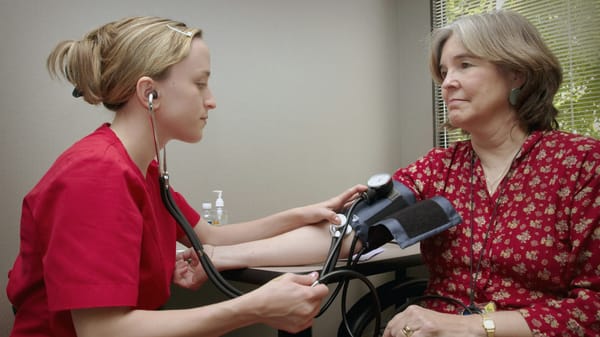The Surprising Reason AI-Driven Diagnostics Are Outperforming Human Doctors
Artificial Intelligence (AI) is revolutionizing healthcare, projected to skyrocket from $11 billion in 2021 to $188 billion by 2030. How is this technology transforming patient care and medical research? Dive in to discover AI's profound impact on the future of medicine!

Did you know the global healthcare AI market is projected to skyrocket to $188 billion by 2030? This rapid growth signals a profound transformation, unlocking new possibilities for diagnosis, treatment, and patient care worldwide.
Artificial Intelligence (AI) is revolutionising the healthcare industry, ushering in an era of unprecedented advancements. From improving diagnostic accuracy to enhancing patient experiences, AI is reshaping healthcare on a global scale. With its potential to expedite drug discovery, personalise treatments, and predict patient outcomes, the impact of AI is truly transformative. In fact, the value of AI in healthcare was a mere $11 billion in 2021, but it’s expected to soar to $188 billion by 2030, highlighting the rapid adoption and growing influence of this technology. This article will explore AI’s diverse applications, the benefits it brings, and the challenges that must be addressed as healthcare evolves. Join us as we uncover the surprising ways AI is poised to redefine the future of healthcare.
The Current Landscape of AI in Healthcare and Its Impact on Medical Research
Artificial Intelligence (AI) is reshaping the global healthcare industry, ushering in innovations that are transforming the way diseases are diagnosed, treated, and managed. The value of AI in healthcare was estimated at $11 billion in 2021, and it is projected to grow at an impressive compound annual growth rate (CAGR) of 37%, potentially reaching $188 billion by 2030. This exponential growth signals a paradigm shift, reflecting the expanding role of AI in revolutionising healthcare systems worldwide. The significance of this transformation cannot be overstated, as AI's ability to process vast amounts of data and identify patterns holds the key to a more accurate, efficient, and personalised healthcare landscape.
AI's applications across healthcare are broad, with transformative effects in various domains. One of the most significant areas is medical research and drug discovery. Traditionally, the process of developing new drugs has been long, expensive, and unpredictable, but AI is speeding up this timeline considerably. Machine learning algorithms can analyse extensive datasets to predict the success rates of chemical compounds, helping researchers identify the most promising drug candidates more efficiently. This not only reduces the time and resources spent on drug development but also accelerates the availability of new treatments for patients. As a result, AI is playing a crucial role in driving medical research innovation and ensuring that life-saving treatments reach the market faster.
In the realm of drug discovery, AI's potential to predict the efficacy of new compounds has already led to significant breakthroughs. For example, AI algorithms are being used to analyse molecular structures and interactions, identifying previously unseen connections that can lead to the development of novel therapeutic drugs. This data-driven approach also minimises human error, ensuring that research efforts are better aligned with successful outcomes. Furthermore, by predicting treatment outcomes and identifying genetic markers associated with diseases, AI is enhancing personalised medicine, providing tailored treatment plans for individual patients based on their unique genetic makeup.
As AI continues to advance, its role in medical research and drug discovery will only grow, opening new doors for treatment innovation. The integration of AI in these fields holds the promise of faster drug development cycles, more effective treatments, and a deeper understanding of complex diseases—ushering in a new era of healthcare that is more efficient, patient-centred, and forward-looking.
Revolutionising Medical Imaging and Data-Driven Healthcare
AI is making profound advancements in medical imaging, a field that plays a critical role in diagnosing diseases and guiding treatment decisions. One of AI's most impressive capabilities is its ability to detect anomalies in medical imaging, such as MRIs, X-rays, and CT scans, with remarkable speed and accuracy. By leveraging deep learning algorithms, AI systems can rapidly analyse images, identifying subtle patterns or irregularities that may be missed by the human eye. This ensures that medical professionals can make faster, more accurate diagnoses, improving patient outcomes by enabling earlier intervention.
In radiology, AI is particularly valuable in increasing diagnostic accuracy. A notable example is the use of AI to detect early-stage cancers, such as lung and breast cancer, through imaging scans. AI algorithms can identify small lesions or tumours that may be difficult to detect manually, thus facilitating early diagnosis when treatments are most effective. For instance, AI has been shown to outperform radiologists in interpreting mammograms for breast cancer detection, leading to fewer false positives and negatives. This enhanced accuracy is crucial, as it directly impacts the timeliness and effectiveness of treatments, improving survival rates and reducing the emotional and financial toll on patients.
Beyond diagnostic accuracy, AI's integration into medical imaging has led to remarkable improvements in patient outcomes. A case in point is the use of AI in emergency departments, where quick, precise imaging analysis is critical for conditions like strokes and heart attacks. In a study conducted at a major hospital, AI algorithms reduced the time required to diagnose strokes from over an hour to just minutes, dramatically improving the chances of successful intervention and recovery. This not only saves lives but also reduces the long-term healthcare costs associated with delayed treatment.
The impact of AI extends beyond imaging and diagnostics into the realm of data-driven healthcare and personalised treatment. Machine learning algorithms are increasingly being used to analyse patient data—from genetic information to medical history—enabling healthcare providers to craft personalised treatment plans that are tailored to the unique needs of each individual. This approach ensures that treatments are more effective, as they are designed with the patient’s specific health profile in mind, rather than a one-size-fits-all model. AI also plays a pivotal role in assessing treatment effectiveness in real-time. By continuously monitoring patient progress through wearable devices or health records, AI can track the impact of ongoing treatments, allowing clinicians to adjust plans as necessary. This ability to evaluate and refine treatment strategies on the fly enhances the precision of medical interventions and can lead to better health outcomes. Furthermore, real-time assessment helps reduce healthcare costs by minimising the need for trial-and-error approaches and optimising resource allocation.
Through data-driven approaches, AI is fundamentally transforming medical interventions. By synthesising vast amounts of data, AI can predict patient responses to treatments, identify potential complications early, and recommend more precise therapies. This shift toward personalised, data-driven healthcare promises to make treatments more effective, reduce unnecessary procedures, and ultimately improve both patient outcomes and the efficiency of healthcare systems globally.
Predictive Analysis, Patient Experience, and the Challenges of AI Adoption
AI is transforming preventative care by enabling healthcare providers to identify at-risk patients early, often before symptoms appear. Using predictive analysis, AI processes large datasets to predict which individuals are most likely to develop certain conditions. For example, AI can evaluate a patient's medical history, lifestyle, and genetic data to flag those at risk for chronic diseases like diabetes or heart disease. This allows for timely interventions, such as lifestyle changes or early treatments, improving long-term health outcomes and reducing healthcare burdens.
In addition to individual care, AI plays a key role in public health surveillance and outbreak detection. By analysing patterns in healthcare data, AI can spot early signs of epidemics or infectious diseases. During the COVID-19 pandemic, AI models helped track the virus's spread, forecast future trends, and inform public health responses. Predictive tools assessed the impact of interventions, guiding governments to manage the crisis effectively. This capacity for anticipating health threats is crucial for future preparedness.
AI is also revolutionising the patient experience, enhancing accessibility and efficiency in healthcare services. Integrating AI into administrative tasks like appointment scheduling has streamlined processes, reducing delays and making healthcare more accessible. AI-powered remote monitoring tools allow healthcare providers to track patients’ health metrics in real time, supporting individuals with chronic conditions or those recovering from surgery. This flexibility reduces strain on healthcare systems and improves patient convenience, offering care outside of traditional clinical settings.
AI-driven chatbots further improve patient interactions by handling routine inquiries and appointment scheduling, providing immediate assistance without requiring a healthcare provider's time. This leads to quicker responses for patients, improving overall healthcare access, especially in underserved areas with fewer healthcare professionals. Despite these advancements, challenges remain. One key issue is data privacy. AI systems require vast amounts of patient data, raising concerns about data security and compliance with regulations like HIPAA. Ensuring robust protection against breaches is critical to maintaining public trust.
Another challenge is algorithmic bias. AI models are only as effective as the data they are trained on. If data is biassed or unrepresentative, AI could perpetuate healthcare inequities. Ensuring diverse, unbiased datasets is essential for fair healthcare outcomes.
In countries like India, AI holds immense potential to address healthcare challenges such as a shortage of professionals and uneven access. By supporting telemedicine, diagnostics, and remote consultations, AI could transform healthcare delivery, though challenges like infrastructure and regulatory frameworks must be addressed.
Ethical Considerations and the Future of AI in Healthcare
As AI continues to revolutionise healthcare, establishing ethical frameworks for its responsible use becomes paramount. These frameworks will ensure that AI applications are deployed in a way that prioritises patient well-being and aligns with societal values. Ethical considerations include ensuring transparency in AI decision-making, accountability for AI-driven outcomes, and making sure the technology benefits all patients equally, regardless of their demographic or socioeconomic status. Developing such frameworks will guide healthcare providers, policymakers, and technology developers in using AI responsibly, fostering trust in the healthcare system.
A critical ethical issue in AI healthcare applications is patient privacy and data security. AI systems require access to vast amounts of sensitive health data to function effectively, raising concerns about how this information is stored, shared, and protected. Healthcare organisations must adhere to stringent privacy regulations, such as HIPAA in the U.S., to safeguard patient information from breaches or unauthorised use. Additionally, data anonymization and encryption techniques should be employed to minimise risks. Ensuring robust data security will be key in maintaining public trust and confidence in AI-powered healthcare solutions.
Another ethical challenge is mitigating algorithmic bias. AI systems learn from historical data, which may include biases based on factors like race, gender, or socioeconomic background. If these biases are not addressed, AI could perpetuate existing healthcare disparities, leading to inequitable outcomes. Continuous monitoring of AI models, along with careful selection and curation of diverse datasets, is essential for minimising bias. Collaboration between healthcare professionals, ethicists, and AI developers is necessary to ensure that AI systems are designed to promote fairness and provide equitable care to all patients.
Looking to the future, AI is expected to drive significant advancements across multiple healthcare domains, including telemedicine, genomics, and robotics. In telemedicine, AI-powered platforms will enable more efficient consultations, remote diagnostics, and personalised treatment plans, providing greater access to care, especially in underserved regions. In genomics, AI will accelerate research into personalised medicine, helping to tailor treatments based on an individual’s genetic makeup. Robotics, empowered by AI, will revolutionise surgery and rehabilitation, improving precision and outcomes. To realise the full potential of AI in healthcare, workforce training and collaboration are essential. Healthcare providers must be equipped with the skills to work alongside AI technologies, while AI developers must understand clinical practices to create systems that meet healthcare needs. By fostering these partnerships, AI and human expertise can converge to provide the best possible care.
The future of healthcare lies in the synergy between AI and human expertise, where technology enhances medical decisions, streamlines operations, and improves patient outcomes. As AI continues to evolve, it has the potential to transform healthcare delivery, making it more personalised, efficient, and accessible to all.
Dr. Emily's Breakthrough: How AI Transformed Her Approach to Patient Care
Dr. Emily Torres, a seasoned physician in a busy urban hospital, had always prided herself on her ability to diagnose complex medical conditions. But after years in practice, she found herself overwhelmed by the increasing volume of patient data and the pressure to stay on top of the latest medical research. One day, during a routine team meeting, her colleague, Dr. James, introduced her to a new AI-powered diagnostic tool that had recently been implemented in the hospital.
At first, Emily was sceptical. She had always relied on her expertise and intuition, unsure whether AI could offer anything beyond a shiny new gadget. But as Dr. James demonstrated how the tool quickly analysed patient data, flagging potential issues and providing personalised treatment suggestions, Emily was intrigued. "It’s like having a second opinion, but faster and more accurate," he explained.
Soon, Emily began integrating the AI tool into her practice, and the results were undeniable. Her diagnostic accuracy improved, and she was able to tailor treatments with greater precision. Patients noticed the difference too, as their outcomes improved thanks to the personalised care AI helped deliver.
Reflecting on the change, Emily realised that embracing AI didn’t diminish her skills but enhanced them. It gave her more time to connect with patients and less time sifting through data. AI had truly transformed her practice, and in doing so, it had transformed her approach to medicine.
Key Takeaways
- AI's Accelerating Growth in Healthcare: The global healthcare AI market is projected to grow from $11 billion in 2021 to $188 billion by 2030, signifying a monumental shift in healthcare innovation and adoption.
- AI in Drug Discovery: AI is revolutionising medical research by speeding up drug discovery, reducing costs, and identifying promising drug candidates faster, potentially bringing life-saving treatments to market more efficiently.
- Improving Diagnostic Accuracy: AI's ability to analyse medical images with greater precision, such as in detecting cancers or strokes, helps improve diagnostic accuracy and leads to better patient outcomes.
- Personalized Medicine Through AI: By analysing patient data, AI is enabling the creation of personalised treatment plans that are tailored to an individual’s unique genetic and medical profile, improving effectiveness and reducing side effects.
- Real-Time Monitoring and Treatment Assessment: AI enables the continuous monitoring of patients' health, allowing for real-time adjustments to treatment plans, ensuring more effective interventions and optimising healthcare resources.
- AI in Preventative Care: Through predictive analysis, AI can identify at-risk patients early, enabling timely interventions that can prevent or mitigate the onset of chronic diseases, improving long-term health outcomes.
- Enhancing Patient Experience: AI-driven tools, such as chatbots and remote monitoring, improve patient interaction and accessibility, streamlining administrative processes and ensuring better overall healthcare delivery.
- Addressing Healthcare Inequities: AI has the potential to address disparities in healthcare by improving access to care in underserved regions, where professional shortages and infrastructure gaps are common.
- Ethical Use of AI: Ethical considerations, including transparency, data security, and reducing algorithmic bias, are crucial to ensuring AI is deployed in a way that promotes fairness and trust in the healthcare system.
- Future of AI in Healthcare: As AI continues to evolve, its integration with telemedicine, genomics, and robotics will drive new innovations, enhancing both the quality and accessibility of healthcare while empowering healthcare professionals to deliver better care.
Your Top Questions Answered
How is AI used in healthcare?
AI in healthcare is used for diagnosing diseases, personalising treatment plans, accelerating drug discovery, analysing medical images, predicting patient outcomes, and improving administrative tasks like scheduling and patient communication.
What are the benefits of AI in healthcare?
AI improves diagnostic accuracy, accelerates drug development, personalised treatment plans, enhances patient outcomes, reduces healthcare costs, and increases operational efficiency in hospitals and clinics.
What are the challenges of AI in healthcare?
Key challenges include data privacy concerns, algorithmic bias, regulatory hurdles, a lack of skilled workforce, and integrating AI systems into existing healthcare infrastructures while ensuring equity in access and outcomes.
How does AI improve diagnostic accuracy?
AI algorithms analyse medical images and patient data to identify patterns and anomalies that might be missed by human doctors, leading to faster, more accurate diagnoses and early detection of conditions like cancer.
Will AI replace doctors in healthcare?
AI is not meant to replace doctors but to enhance their capabilities by providing data-driven insights, improving diagnostic accuracy, and streamlining administrative tasks, allowing healthcare professionals to focus more on patient care.
Conclusion
Artificial Intelligence (AI) is transforming the healthcare landscape, revolutionising everything from diagnostics and treatment personalization to operational efficiency and patient outcomes. Its ability to process and analyse vast amounts of medical data has the potential to accelerate drug discovery, improve diagnostic accuracy, and predict patient outcomes with unprecedented precision. AI applications in medical imaging, predictive analysis, and personalised treatment plans are already making a significant impact, enhancing both the quality and speed of care.
However, despite these advancements, the integration of AI into healthcare is not without its challenges. Issues such as data privacy, algorithmic bias, and the need for skilled professionals remain obstacles to overcome. Ethical considerations surrounding AI usage must also be prioritised, ensuring that technologies are developed and deployed responsibly to benefit all patients equally.
Looking ahead, AI's role in healthcare will only continue to expand, shaping the future of medicine in innovative ways. By fostering collaboration between healthcare professionals, AI developers, and policymakers, we can harness AI's full potential to create a more personalised, efficient, and accessible healthcare system. The future promises a seamless integration of human expertise and AI, ultimately improving patient care and revolutionising the healthcare industry on a global scale.
References
https://www.who.int/initiatives/artificial-intelligence-for-health
https://hbr.org/search?term=AI+in+healthcare
https://www.nih.gov/search?utf8=%E2%9C%93&affiliate=nih&query=artificial+intelligence+healthcare
https://jamanetwork.com/searchresults?query=artificial%20intelligence
https://www.mckinsey.com/industries/healthcare-systems-and-services/our-insights
https://www.ibm.com/watson-health
https://www.technologyreview.com/tag/healthcare/
https://www.forbes.com/healthcare/
https://www.healthaffairs.org/do/10.1377/hblog20211101.696394/full/
https://med.stanford.edu/topics/artificial-intelligence.html
https://www.weforum.org/agenda/2021/11/ai-technology-healthcare/
https://www.thelancet.com/digital-health
https://www.pwc.com/gx/en/industries/healthcare/emerging-technologies/ai.html
https://ww2.frost.com/research/industry/healthcare/artificial-intelligence/
https://www.accenture.com/us-en/insights/health/artificial-intelligence
https://pulse.embs.org/article-categories/artificial-intelligence/
https://www.scientificamerican.com/topic/artificial-intelligence/
https://www.oecd.org/health/artificial-intelligence-in-healthcare.htm
This article was written by Lucía Romero Lastra, a seasoned writer and editor with expertise in crafting engaging and informative articles




